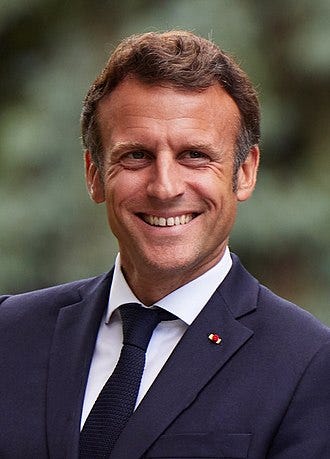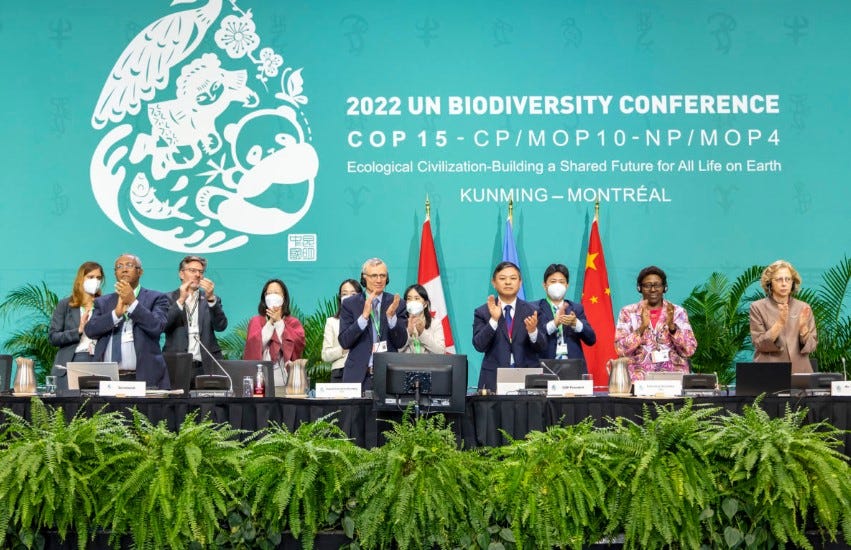The Weekly Anthropocene: 2022 in Review
Dispatches from the Wild, Weird World of Humanity and its Biosphere
We were all very, very lucky this year. Around the world, key elections, policy decisions, international conferences, and energy markets avoided disaster in 2022, and in many cases made substantial progress towards a cleaner, brighter future.
When Russia brutally invaded Ukraine in February, the Western world came together in a fight against authoritarianism-and launched a great collaborative effort accelerating the transition to clean, renewable energy. The European Union rapidly rolled out a bloc-wide plan to transition away from Russian gas, and it’s already paying dividends:
The think tank Ember calculated that wind and solar alone produced a quarter of the European Union’s electricity since Russia invaded Ukraine.
Solar alone provided a record 12% of the EU’s electricity from May through August.
Unprecedented wind and solar growth in 2022 avoided billions in gas costs.
Under the new energy transition plans, the EU should reach at least 63% renewable electricity by 2030, up from 55% under previous commitments.
As Politico recently wrote, “It took a war criminal to speed up Europe’s green revolution.”
Globally, renewable energy continues to outpace even the most optimistic projections of the 2010s. The International Energy Agency (IEA) made its largest-ever upward revision to its renewables forecast: they now expect renewables to overtake coal in global electricity production by 2025 and global fossil fuel use to peak within five years! (Here’s the full report). Among other renewables progress:
Wind, solar, and hydro met all electricity demand growth in the first half of 2022, preventing a substantial rise in fossil fuels.
Indonesia and Vietnam signed Just Energy Transition Partnerships, with an array of rich countries helping pay for faster transitions away from coal.
And electric vehicles absolutely crushed it in China in 2022, with fully-electric BEVs accounting for 22% of new car sales in January through October 2022, rising to 29% plug-in vehicles when you add hybrids to the BEV tally. At this rate, over 50% of new car sales in the world’s largest car market may be electric-only by 2025.
“The global energy crisis has triggered unprecedented momentum behind renewables, with the world set to add as much renewable power in the next 5 years as it did in the past 20.”
-International Energy Agency






Around the world, climate-smart candidates won key elections in 2022, preventing reactionary backsliding and enabling further progress.
Emmanuel Macron, the incumbent President of France, won reelection in April on a platform that included building lots more offshore wind, defeating Marine Le Pen, a challenger who wanted to ban wind turbines in France and take down existing ones.
In May in Australia, Anthony Albanese defeated Scott Morrison to become the new prime minister, replacing a longtime shill of the coal industry with an environmental champion already making moves on bold new climate and biodiversity initiatives.
In October in Brazil, the nightmarish Jair Bolsonaro lost reelection to Luiz Inácio Lula da Silva, a former Brazilian President who presided over a record decrease in deforestation during his previous administration. (Here’s The Weekly Anthropocene’s analysis of the Brazilian election).
And in November, the American midterm elections were shockingly good for Democrats, who expanded their Senate majority, lost the House only by a whisker, and took control of several key state governments. (Here’s The Weekly Anthropocene’s analysis of the 2022 midterms).
One of the biggest victories of the year for climate change and the renewables revolution was, of course, the Inflation Reduction Act, the political miracle that invested over $365 billion in the clean energy transition through 2030. (Here’s the original The Weekly Anthropocene analysis).
This brought the total Biden Administration climate funding to over $500 billion when adding in funds from the CHIPS and Science Act and 2021’s Bipartisan Infrastructure Law, more than tripling the federal government’s annual spending on climate issues.
It has essentially future-proofed the clean energy transition in America, ensuring that even in a recession, federal funding will lock in renewable energy as a good investment.
A clean manufacturing boom has already begun, with over 20 new solar, wind, and battery manufacturing projects announced since the IRA was signed in mid-August.
This writer wakes up every morning thankful for the Inflation Reduction Act and goes to sleep every night thankful for the Inflation Reduction Act. Climate activists have been pushing for something like this since the 1990s, and 2022 is the year when we finally got it! This is going to keep paying dividends for decades, and is up there with support of Ukraine as the single biggest achievement of the Biden Administration to date.
“This year, the American people won, and the climate deniers lost.”
-President Joe Biden
And a great new victory was won in 2022’s last weeks! On December 19th, 196 countries adopted the Kunming-Montreal Global Biodiversity Framework, agreeing to four goals and 23 targets to preserve Earth’s biodiversity. (Here’s the full text).
A major headline result is the new pledge to preserve 30% of Earth’s land and 30% of Earth’s oceans by 2030, up from 17% of Earth’s land and 10% of Earth’s oceans today.
Other key targets include phasing out $500 billion worth of biodiversity-harming subsidies and mobilizing at least $200 billion annually in biodiversity protection funding, both by 2030.
This agreement is voluntary, not legally binding, but it’s critical in that it gets all the world’s governments on the same page, moving towards a shared civilizational goal.
If even partially implemented, this has the potential to be a landmark global deal on biodiversity with an impact comparable to the Paris Climate Agreement of 2015! Future generations may look back on this as an inflection point in humanity’s relationship with its biosphere.
In sum, 2022 could have been a disaster. We could have had the EU cave to Russia and continue using its gas, wannabe autocrats win elections in America, Brazil and France, a wasted chance for Democratic majority to pass a big climate bill leading to division and recrimination, a slowdown in the global renewables transition, and a fizzle at the global biodiversity conference. None of that happened: instead, democracy, clean energy, and global cooperation on climate action came out of 2022 stronger than they went into it. This writer is excited to see what happens in 2023!










Wonderful way to sum up the year!! You make a very good argument that we should all feel optimistic about 2023 prospects! Thanks!